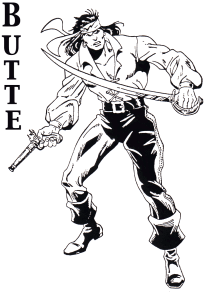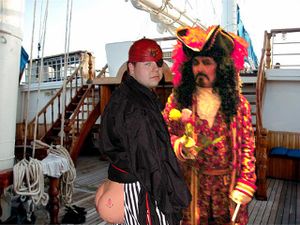Butt pirate
In international seafaring, butt pirates are able-bodied sea men with a reputation for aggressiveness, ruthlessness and for having been at sea a little too long.
Captains of butt piracy ships are most easily identified by the size of their tackle; their first mates are readily distinguished by their experience as expert coxswains.
History[edit | edit source]
While butt piracy is part of the long maritime tradition of rum, sodomy and the lash, most of the original butt pirates owe their first seafaring experience not to piracy but to smuggling and contraband. In halal or kosher nations, smuggling of pork sausage is a common first experience at sea; particularly meat-starved seafarers may also be prone to hide the salami.
Inevitably, seafaring activities soon go beyond pork-and-beans contraband and sausage smuggling into full-fledged sea piracy. Shiver me timbers and blow me down! Avast ye peg boys and prepare to be boarded! ARR!
Modus operandi[edit | edit source]
Traditionally, butt pirate attacks on the open sea have relied on the element of surprise. According to Captain Richard Swallow of the Brown Pearl, butt pirates typically board a stricken vessel without warning, from the stern. A crew member nonchalantly swabbing the poop deck one moment may find himself being unexpectedly taken by pirates the next.
The battle for control of the ship is normally led by the pirate Captain and First Mate, who are quick to engage in vigorous swordfighting in order to get their way. Those scurvy dogs who resist are tied to the masts and flogged with the cat o' nine tails until they can take no more. While the miserable bilge rats may often try to conceal key assets, butt pirates are wily and known to search for treasure in inconspicuous locations.
Economic impact[edit | edit source]
A stricken ship is typically robbed of everything - vessel, cargo and sea men often disappear without a trace.
More sea men have been lost or swallowed into the deep as a result of the butt pirates than due to all other maritime hazards combined, sirens to mermaids. The attack on the MV Julius Schmid, a vessel of San Francisco registry which had set sail from Dildo, Newfoundland for the Greek islands with holds filled with cargo of KY Jelly, is a case in point. Before the crew realised what was happening, the pirates had boarded, unsheathed their swords and taken control of ship and cargo. While a sudden shriek was transmitted as a ship's distress call, neither the ship nor her crew were heard from again.
When ruthless butt pirates board merchant vessels in search of booty, they are all but unstoppable until they are satisfied. By then, in most cases it's too late to rescue any lost sea men.
Countermeasures[edit | edit source]
While additional navel vessels have been deployed at the behest of the Rear Admiral, their numbers are currently insufficient. "We can't be in sixty-nine places at once" claim officials, as deployment of more ships would require more ample quantities of salty sea men - a slippery target at best. In any case, mugging a pirate is risky and best avoided.
One alternative has been to rely on greater deployment of gaydar by merchant sea men. Early warning of an attack could save ships from being taken over by pirates bedecked in eye patches, peg legs and far too much leather. Even with the most modern in equipment, however, it is not uncommon for a boatload of hairdressers or interior decorators to simply slip off the gaydar without even so much as a limp-wristed SOS, never to be seen again after carelessly sashaying into butt pirate infested waters.
The only other viable option would be a naval recruitment drive, modelled on that conducted by the Village People during the late 1970's. Recruit, recruit, recruit!
Sea also[edit | edit source]
- Pirate
- Pie rat
- Pirate dream
- USS Manlove
- Ninja pirates
- Pirates versus Ninjas
- You are a pirate
- Flying Spaghetti Monster






